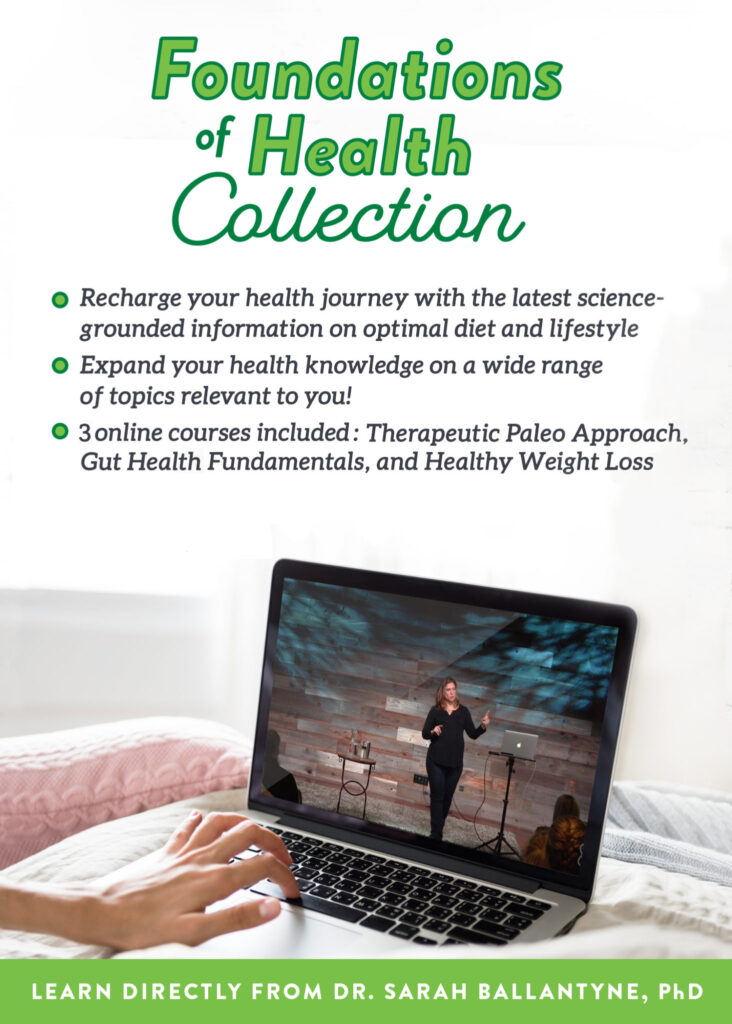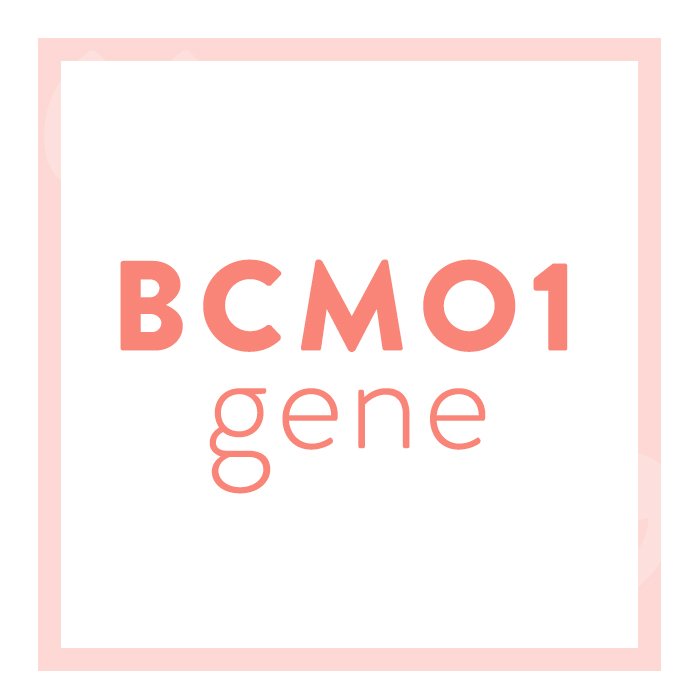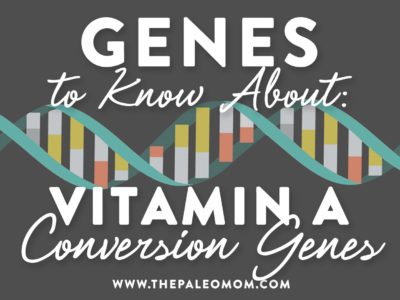Genetic testing can give us tremendous insight into our own health and, more importantly, our optimal diet and lifestyle choices given our genetic predisposition. I’ve long held that the Paleo diet is far from a one-size-fits-all approach and try to steer away from Paleo dogma in all of my writing. In this series, I am covering specific genes that can tell us a lot about disease risk and how we can modify our implementation of Paleo to mitigate that risk (See Genes to Know About: ApoE, Genes to Know About: MTHFR, Genes to Know About: Caffeine Metabolism, Genes to Know About: Breast Cancer Genes, and Genes to Know About: Rheumatoid Arthritis Genes). You may be able to request genetic testing through your doctor (my functional medicine doctor ran genetic screening on me as part of my first evaluation) or you can order a genetic test to do at home. I recommend 23andMe which you can purchase here.
Plant vs Animal Vitamin A

When many people hear the words “vitamin A,” the first thing that comes to mind are carrots (and maybe other plant foods like sweet potatoes and leafy greens). After all, we’re often told that bright orange and green veggies are high in this essential nutrient, famous for keeping our vision healthy and our bones strong. (Vitamin A is involved in a number of other important functions, too, like immune function, tooth remineralization, embryotic development, skin protection, and cell differentiation.)
Save 80% Off the Foundations of Health
Expand your health knowledge on a wide range of topics relevant to you, from how to evaluate scientific studies, to therapeutic diet and lifestyle, to leaky gut and gut microbiome health, to sustainable weight loss, and much more!!!

 It takes some extra research (or hearing me hammer home Why Everyone Should Be Eating Organ Meat!) to learn that plant foods don’t actually contain a single molecule of vitamin A! True vitamin A (retinol) is found only in animal foods—particularly liver, egg yolks, dairy fat, and seafood. Plant foods contain vitamin A precursors (most notably beta-carotene, and to a lesser extent alpha-carotene and beta-cryptoxanthin), which the body must convert into retinol.
It takes some extra research (or hearing me hammer home Why Everyone Should Be Eating Organ Meat!) to learn that plant foods don’t actually contain a single molecule of vitamin A! True vitamin A (retinol) is found only in animal foods—particularly liver, egg yolks, dairy fat, and seafood. Plant foods contain vitamin A precursors (most notably beta-carotene, and to a lesser extent alpha-carotene and beta-cryptoxanthin), which the body must convert into retinol.
The problem is, the beta-carotene absorption and conversion processes tend to be extremely inefficient, and can be influenced by a host of different factors like levels of thyroid hormone, alcohol intake, and… you guessed it… genetics! In fact, certain polymorphisms of the most important gene for converting beta-carotene into retinol, beta-carotene 15,15′-monooxygenase (BCMO1), dramatically reduce people’s ability to obtain vitamin A from beta-carotene. For anyone with impaired conversion, consuming pre-formed vitamin A from animal foods is absolutely important!
What Is BCMO1?

The BCMO1 gene codes the BCMO1 protein, which cleaves beta-carotene into two molecules of retinal (a form of vitamin A that can be converted to and from retinol, which is the storage and transport form of vitamin A). This conversion happens mainly in the intestinal mucosa (gut barrier), but also occurs in the liver and other organs. Every person has two copies of the BCMO1 gene. But, about 45% of the population carries at least one gene variation that reduces BCMO1 enzyme activity, resulting in significantly impaired ability to convert beta-carotene into retinal. Depending on which combination of variants someone inherits, beta-carotene conversion can be nearly 70% lower than its normal efficiency!
Considering carotenoids are already poorly absorbed to begin with (typically, 3% or less of ingested carotenoids are actually absorbed) and the conversion rate can be low in general (a conversion factor of 28:1 for beta-carotene to retinal has been found for some plant foods, including leafy greens), having reduced BCMO1 activity makes it difficult if not impossible to get enough vitamin A from plant foods alone.
How to Tell if You’re a “Poor Vitamin A Converter”
Genetic tests, such as 23andMe, can tell which BCMO1-related variants you carry and help estimate your conversion efficiency. The polymorphisms rs7501331 and rs12934922 are the main ones to look at. For people with a T allele on rs7501331, beta-carotene conversion is reduced by about 32%. For people who carry a T allele on both rs7501331 and rs12934922, the conversion rate drops by nearly 70%!
And, while the existing research is more limited, some studies suggest other polymorphisms located near the BCMO1 gene can also reduce BCMO1 enzyme activity and thus impact beta-carotene conversion. Carrying the A/A alleles of rs6420424 reduces conversion by 59%; carrying the G/G alleles of rs11645428 reduces conversion by 51%; and carrying the G/G alleles of rs6564851 reduces conversion by 49%.
What to Do if You’re a Poor Vitamin A Converter
 Although the ideal vitamin A intake depends on a variety of factors, the current recommend dietary allowance is set at 900 mcg daily for men and 700 mcg daily for women, with guidelines for pregnant and nursing women between 1200 and 1300 mcg per day. Using retinol activity equivalents, 12 mcg of beta-carotene is needed to equal one mcg of retinol (so for example, an intake of 600 mcg of beta-carotene would only be equivalent to 50 mcg of vitamin A). Apart from genetics, people with reduced bile acid, liver disease, or alcoholism may need more vitamin A than the rest of the population due to the effects of these conditions on vitamin A conversion and metabolism.
Although the ideal vitamin A intake depends on a variety of factors, the current recommend dietary allowance is set at 900 mcg daily for men and 700 mcg daily for women, with guidelines for pregnant and nursing women between 1200 and 1300 mcg per day. Using retinol activity equivalents, 12 mcg of beta-carotene is needed to equal one mcg of retinol (so for example, an intake of 600 mcg of beta-carotene would only be equivalent to 50 mcg of vitamin A). Apart from genetics, people with reduced bile acid, liver disease, or alcoholism may need more vitamin A than the rest of the population due to the effects of these conditions on vitamin A conversion and metabolism.
If you’re one of the many people with genetically reduced BCMO1 activity, there are several things you can do to make sure your body gets enough vitamin A to support optimal health. Those include:
- Eat pre-formed vitamin A. Regularly consume foods rich in preformed vitamin A, including liver (the best source by a landslide!), eggs (the retinol is concentrated in the yolk), fish liver oils (especially cod liver oil), full-fat dairy products (if you tolerate them), and seafood (eel, tuna, clams are particularly good sources). Other animal products contain vitamin A in smaller amounts. See 3 Painless Ways to “Eat Your Liver”
- Eat some fat with those veggies. When eating beta-carotene rich foods like dark leafy greens and carrots, consume some fat along with the meal (this could be a drizzle of olive oil on a salad, some ghee with a sweet potato, some guacamole dip with carrots—the possibilities are endless!). Even small amounts of fat enhance beta-carotene absorption and increase the amount available to convert into vitamin A. One study found that an addition of 2.4g of fat, 5g of fat, and 10g of fat to a meal of yellow and green vegetables were all equally effective in boosting beta-carotene absorption (in other words, we don’t need to slather our food with a whole stick of butter to get that absorption boost—just a little fat does the trick! See Saturated Fat: Healthful, Harmful, or Somewhere In Between? and Carbs Vs. Protein Vs. Fat: Insight from Hunter-Gatherers).
- Don’t forget synergistic nutrients. It’s important to also consume adequate iron, zinc, niacin, and riboflavin. Iron is needed for BCMO1 enzyme activity, and zinc, niacin, and riboflavin serve as cofactors for the enzymes that convert retinal to retinol. A deficiency in any of these nutrients can impede beta-carotene conversion.
Keep in mind, beta-carotene-rich foods are still valuable even if they don’t supply all of our vitamin A needs (such foods are typically high in a variety of micronutrients, fiber, and phytochemicals, all of which benefit our health in diverse ways!). A Paleo diet that includes organ meats like liver (as well as other nutrient-dense animal foods), along with a diverse spectrum of plant foods (see The Importance of Vegetables, The Diet We’re Meant to Eat, Part 3: How Much Meat versus Veggies?, The Amazing World of Plant Phytochemicals: Why a diet rich in veggies is so important!, and The Fiber Manifesto-Part 1 of 5: What Is Fiber and Why Is it Good?), is the way to go achieving ideal vitamin A levels—and for avoiding the many health problems that can result from an inadequate intake of this amazing vitamin.
Citations
Balmer JE & Blomhoff R. “Gene expression regulation by retinoic acid.” Lipid Res. 2002 Nov;43(11):1773-808.
de Pee S, et al. “Orange fruit is more effective than are dark-green, leafy vegetables in increasing serum concentrations of retinol and beta-carotene in schoolchildren in Indonesia.” Am J Clin Nutr. 1998 Nov;68(5):1058-67.
Hedren E, et al. “Estimation of carotenoid accessibility from carrots determined by an in vitro digestion method.” Eur J Clin Nutr. 2002 May;56(5):425-30.
Khan NC, et al. “The contribution of plant foods to the vitamin A supply of lactating women in Vietnam: a randomized controlled trial.” Am J Clin Nutr. 2007 Apr;85(4):1112-20.
Leung WC, et al. “Two common single nucleotide polymorphisms in the gene encoding beta-carotene 15,15′-monoxygenase alter beta-carotene metabolism in female volunteers.” FASEB J. 2009 Apr;23(4):1041-53. doi: 10.1096/fj.08-121962. Epub 2008 Dec 22.
Lietz G, et al. “Single nucleotide polymorphisms upstream from the β-carotene 15,15′-monoxygenase gene influence provitamin A conversion efficiency in female volunteers.” J Nutr. 2012 Jan;142(1):161S-5S. doi: 10.3945/jn.111.140756. Epub 2011 Nov 23.
Moro JR, et al. “Vitamin effects on the immune system: vitamins A and D take center stage.” Nat Rev Immunol. 2008 Sep;8(9):685-98.
Pizzorno L. “Common Genetic Variants and Other Host-related Factors Greatly Increase Susceptibility to Vitamin A Deficiency.” Longevity Medicine Review. March 2010.
Ribaya-Mercado JD, et al. “Carotene-rich plant foods ingested with minimal dietary fat enhance the total-body vitamin A pool size in Filipino schoolchildren as assessed by stable-isotope-dilution methodology.” Am J Clin Nutr. 2007 Apr;85(4):1041-9.
Stephensen CB. “Vitamin A, infection, and immune function.” Annu Rev Nutr. 2001;21:167-92.
Tang G. “Bioconversion of dietary provitamin A carotenoids to vitamin A in humans.” Am J Clin Nutr. 2010 May;91(5):1468S-1473S. doi: 10.3945/ajcn.2010.28674G. Epub 2010 Mar 3.




 30 Recipes for your Whole 30
30 Recipes for your Whole 30